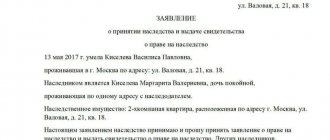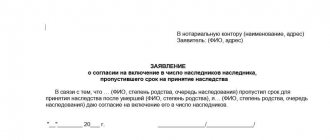In the event of the death of a relative who owned real estate, applicants for succession are required to prepare documents for inheritance of the house and land plot as soon as possible. It is important to understand that the list of necessities differs from the succession of an apartment, and by preparing the papers on time, you can avoid the time spent on registration. Heirs should know the terms and specifics of inheriting houses and the land on which they are located, otherwise there is a risk of not receiving ownership of the territory that the deceased had used for many years.
What you can get
The owner of property can draw up an order during his lifetime for the inheritance of his possessions by a certain circle of persons. These can be relatives of any degree of closeness and strangers. Since it is not difficult to divide and register a house under a will, the testator himself determines the future owners, this procedure does not raise any questions.
However, in the absence of an order, if the heirs refuse the will or are declared unworthy by a court decision, close relatives of the deceased become applicants. The size of the shares is determined by the notary, and they include:
- house;
- non-residential buildings;
- the territory of the land plot on which the property is located;
- natural resources located within the boundaries of this territory;
- bodies of water;
- plants.
If the size of the territory and the area of the inherited housing allow, the successors can receive shares in kind. If it is impossible to allocate shares, joint ownership is registered. Any operations with housing and adjacent territory in the current circumstances are carried out with the consent of the co-owners and only after completion of registration activities.
Methods of inheriting a dacha
You can inherit a dacha only after opening an inheritance. The opening date is the day of death of the testator or, in the case of his disappearance, the date determined by a court decision declaring the citizen dead. Relatives can claim part of the valuables left by the deceased according to the law, and if a will is drawn up, close friends or acquaintances and legal entities also become applicants.
In law
The law provides for 8 lines of inheritance, the priority of each of which is determined by the degree of relationship with the deceased (Articles 1141 - 1145 of the Civil Code of the Russian Federation). Children, parents, spouses of the deceased, as well as grandchildren by right of representation (instead of a previously deceased child of the testator) may be the first to inherit; the second to inherit are brothers and sisters, grandparents, and by right of representation - nephews and nieces; third - uncles and aunts of the deceased or their children by right of representation. Representatives of other orders are more distant relatives (Article 1145). In order for the property to go to specific persons, the owner of the dacha has the right to draw up a testamentary document.
By will
To draw up a will, the owner of the dacha must contact a notary office, bringing with him:
- passport;
- cadastral plan of the land plot;
- extract from the cadastral book;
- certificate of ownership of property;
- calculations of the cost of land and buildings.
In the will, it is necessary to specifically determine who gets the dacha, not forgetting that the land is also subject to inheritance. An incorrectly drawn up will can become a cause for disputes between heirs.
Deadlines
The fixed time frame for registering real estate, namely, a house as an inheritance, is six months from the date of death of the owner. Since there may be several applicants who want to register an inheritance for a house and land, they all need to contact the notary office that opened the case with the desire to declare themselves.
Applicants who do not apply within the established time frame for registration are excluded from the list of legal successors. Their possible share is divided among the citizens who have declared themselves. However, the heir has the opportunity to restore his rights to ownership of the real estate or its share. To do this, you need to file a claim in court. In this case, it will be necessary to provide a document indicating the presence of a special reason that prevented you from declaring yourself on time.
In addition, it will be possible to restore the terms of inheritance if the applicant can prove the lack of information about the death of the home owner. If the court satisfies the requirements, the division of shares will be reviewed and the legal owner will receive possession of the part due to him.
How to inherit a non-privatized dacha
In our practice, we often encounter situations where the owner of a dacha did not have time or did not want to formalize his rights to dacha property, that is, he did not privatize it. In this case, the heir is obliged to act strictly according to these instructions:
- We receive the corresponding extract from the Unified State Register.
- We make a request to the BTI to obtain a technical passport for the dacha.
- We carry out an independent assessment of all buildings on a summer cottage (in principle, this can also be done by BTI employees).
- We file a lawsuit to recognize the heir's ownership of the dacha.
- We receive a positive court decision and register ownership of the property.
It is worth noting that if a non-privatized dacha belongs to a gardening partnership, then the potential heir is obliged to contact the board of this association with a desire to join its ranks. If the answer is positive, the testator’s property can be privatized in accordance with the so-called dacha amnesty.
Necessary documents for inheriting a house and land
Having learned about the possibility of inheriting a house, the successors are wondering what documents are needed to register an inheritance with a notary. It is important to understand that the share in the house specified in the will can only be inherited along with the adjacent territory. If the deceased relative did not include this clause in the will, the heirs will divide the property according to the law. Thus, land documents are a prerequisite for inheriting a house.
Since persons who are not related to the deceased can inherit under a will for a house and land, the provision of a document with the will of the deceased is considered a mandatory condition. All real estate papers must be valid, correctly completed and not expired.
For home
The list of documents required for performing notarial acts and accepting inheritance for a house is similar to that required for the succession of other objects, both residential and non-residential. It is recommended to submit them to a notary at the place of registration of the testator or location of the house. There is no need to worry about how to correctly register an inheritance for a house - a specialist will do it for you. It is important to provide the following:
- Identity card of the legal successor.
- A document indicating the death of a citizen who owned a home.
- Confirmation of family ties between the deceased and the applicant for housing.
- Will (if there is one).
- A certificate indicating the fact of ownership of real estate by the deceased.
- Certificates from the technical inventory bureau, management company and house register.
- Information on an independent assessment of the value of the object of inheritance as of the date of death of the owner.
Passports, wills and certificates are provided within the time period of registration designated by law in order to enter into an inheritance. Applicants will need to fill out an application indicating the requirement to satisfy their rights to inheritance. The state fee for the provision of notary services is paid in advance, and confirmation of its payment is included in the package of documents.
For land
When inheriting land, successors are required to know what documents are needed to inherit land under a will or without it. In addition to the list provided for the inheritance of a residential property, it will be necessary to prepare:
- Cadastral passport (land owners own such a document). It indicates the boundaries of the site, its area and other technical characteristics.
- Confirmation of the property of the deceased testator (any agreements for the acquisition of territory).
- An act drawn up by an independent assessment commission, taking into account data current as of the date of death of the owner.
Registration of inheritance of a house and land occurs in standard terms and can be complicated only if there are problems with the documents. Most often, there are discrepancies between the cadastral passport data and the real characteristics of the plot. In this case, the applicant for obtaining ownership rights must solve the problems at his own expense.
Decoration of a house located on SNT
Succession in relation to the house and adjacent territory located in the SNT is carried out by order or according to the legal order of heirs. Future successors should pay attention to whether land ownership has been registered. If the documents have not been executed, i.e. the testator does not have ownership rights to the house or land, the possessions are not included in the mass of inherited property.
There are two ways to register rights by the testator:
- Privatization of real estate. Even the unfinished procedure matters. The heirs will have to provide documents indicating that privatization has been completed or begun.
- The presence of an agreement indicating the perpetual lease of the territory by the testator. In this case, the notary is provided with a contract for lifelong use of the plot.
The rest of the list of documents for registering an inheritance for a land plot and a house remains unchanged. In addition to real estate, the successors become the owners of natural resources, soil and reservoirs located on the territory they have acquired as property. Issues regarding the division of shares are agreed upon with the chairman of the partnership, who will be able to help correctly divide the parts of the land.
Features of selling inherited land, houses
The sale of inherited real estate is possible immediately after the end of its state registration. However, many potential buyers try to avoid purchasing property that was inherited less than three years ago. This period is not accidental - this is precisely the period of limitation, that is, the period of time during which the seller’s right of inheritance can be challenged. It is important for successors to take this fact into account and, if possible, wait it out, and not dump, perplexed by the low demand for the property offered for sale.
The actual period within which the right of inheritance can be challenged is 10 years from the date of death of the testator.
The documents required to conclude a purchase and sale agreement are:
- Passports of the parties.
- An extract from Rosreestr about the registered ownership of the object and about other transactions carried out with this property during its existence.
- Certificate of right to inheritance.
- Certificate of absence of arrears in payment of utilities and taxes.
- Deeds establishing the title to real estate of the previous owner.
- Technical certificate.
- Boundary plan.
- Home Book.
- Permission from the remaining owners and the guardianship authority, if a minor is registered in the living space.
You should also be prepared to provide the potential buyer with other documents that can dispel his doubts about the fairness and transparency of the transaction. This may be a will or a document confirming the seller's right of inheritance by law.
Otherwise, the sale procedure is no different from the standard alienation of real estate:
- The parties enter into an agreement (you can sign it either independently or with the assistance of a notary or lawyer.
- The buyer makes payment.
- Based on the contract and other documents, the property is registered in the state real estate register and officially becomes the property of the acquirer.
Example 1. A deceased citizen left an unregistered house with a small plot in the suburbs to his daughter and son - the successors of the first legal line of inheritance (there were no more equal applicants). He lived on the property and farmed the land for 12 years before his death.
The daughter was not interested in the inheritance, and the son moved into the house. Over the next 3 years, he lived in it, maintained and made significant material improvements to the property at his own expense.
After 15 years, he decided to register the received inheritance as his property. To do this, the successor collected a package of the following documents:
- Your passport.
- Death certificate of the testator.
- Own birth certificate.
- A contract for the employment of workers who carried out home repairs, receipts for payment of utility bills, checks indicating the purchase of furnishings, building materials, garden tools, seeds and seedlings, witness statements and other evidence of actual ownership of real estate by the testator and heir for a total of 15 years .
He filed documents and evidence in court. Further, based on the received court decision recognizing the actual use of the real estate, the successor registered it in his name at the territorial office of Rosreestr.
Example 2. The testator bequeathed all his property to his common-law spouse and sibling. At the time of his death, the estate consisted of a house and land. Over the past three years, the brother did not make himself known, did not react in any way to the death of his relative and, accordingly, did not accept the inheritance.
The common-law wife of the now deceased, after nine months from the date of opening of the inheritance, declared acceptance of half of the hereditary property of her husband's brother and received a certificate of right to it. After that, she sold the property.
But after 4 years, her husband’s missing relative came to her demanding compensation for half of the cost of the house and land. It turned out that he lost his memory after an accident, spent a long time recovering his health in a medical facility, and then lived and worked in a neighboring city. He learned about his origin and the death of his brother from an acquaintance who accidentally met him on the street.
The heir who appeared collected certificates from the medical institutions that treated him and testimony of witnesses, on the basis of which he restored the deadline for accepting the inheritance through the court.
By decision of the court, the notary canceled the issued certificate of the right to inheritance and redistributed the estate to two successors. And since, according to the law, a bona fide buyer is not obliged to return an item acquired in exchange for compensation, monetary compensation for half of the inherited property was demanded from the testator’s common-law wife.
The state registration authority may return the applicant’s documents on the basis of their non-compliance with established standards, as well as refuse to register a property on the grounds specified in Articles 26 and 27 of Law No. 218-FZ. The lawyers of the ros-nasledstvo.ru portal will help you understand the reasons for the occurrence of such situations or prevent their occurrence - they are ready to provide a free consultation as the initial stage of solving the problem and offer comprehensive measures to completely eliminate it.
FREE CONSULTATIONS are available for you! If you want to solve exactly your problem, then
:
- describe your situation to a lawyer in an online chat;
- write a question in the form below;
- call Moscow and Moscow region
- call St. Petersburg and region
Save or share the link on social networks
- FREE for a lawyer!
Write your question, our lawyer will prepare an answer for FREE and call you back in 5 minutes.
By submitting data you agree to the Consent to PD processing, PD Processing Policy and User Agreement
Useful information on the topic
8
Testamentary disposition for bank deposit
The legislation of the Russian Federation provides its citizens with the opportunity to leave posthumous orders...
10
Where and to whom to complain about a notary
A notary is a person authorized by the state to perform notarial acts....
3
Making a will for a house and land
The purpose of acquiring a house, land, summer cottage or any other property...
2
Valuation of an apartment for inheritance
The purpose of appraising an apartment is to obtain the appropriate act, which is included in…
7
Are debts and loans of parents transferred to children?
An unpleasant surprise when receiving an inheritance may be that the testator has...
7
Recognition of a citizen as dead in court
The death of the testator is a fundamental condition for opening an inheritance case. To…
Algorithm of actions
The received certificate of ownership is not a document of title, but only serves as confirmation of inheritance rights. Therefore, having received documents from a notary, you need to contact Rosreestr to register your rights. It is worth remembering that the house and the land plot are two separate objects, two packages of documents are collected for them and two USRN extracts are issued. The cost and timing of registration depend on the method of submitting documents and the number of real estate objects.
The entire inheritance procedure is as follows:
- Collection of documents for registration of inheritance (proof of belonging to the family of the deceased, extract from the Unified State Register of Real Estate for the house and land, will).
- Handling a notarial application.
- Obtaining a certificate of inheritance.
- Payment of the state fee for registration of rights.
- Contact the MFC or Rosreestr.
- Obtaining title documents.
Registration of inheritance for a house after the death of the owner will take about 180 days, and registration of real estate in the state register will take up to 14 calendar days. Before this period, the future owner cannot consider the property to be his own and dispose of it.
Before re-registering property, successors are wondering how much it costs to register an inheritance. The amount of expenses primarily includes state duty, the amount of which varies depending on the value of the property and the degree of relationship. In addition, you must pay for notary services, according to the tariffs applied in the region.
Registration of ownership rights to the house and adjacent territory is also subject to state duty. Unplanned expenses will be incurred by the heirs if it is necessary to prepare additional documents, when challenging the order of the deceased or resolving issues in court.
Registration of leased or in use land
If you own a plot of land on a lease or use basis, in order to become the full owner of such land, you need to contact the Ministry (Committee) of Property Relations or the district administration to purchase such plots. It is especially important not to delay resolving this issue if we are talking about registering ownership of the land plot under the house.
The law provides for the opportunity to purchase leased plots in three options:
- without tendering;
- on the auction;
- in accordance with the terms of the lease agreement, which provides for the option to buy.
Redemption without bidding
This is possible if:
- there are buildings, structures and premises on the site owned by the tenant;
- the site has agricultural purposes and has been in operation for more than 3 years and the contract has not yet expired.
The procedure is not extremely difficult if you have the following documents:
- application for the provision of land ownership;
- master plan received upon application to the BTI;
- geodetic plan (its preparation must be ordered from a geodetic company);
- cadastral plan (if available, otherwise, you need to obtain it from the Cadastral Chamber, the cost of the service is 200 rubles);
- a document confirming the right of ownership of the plot (agreement on the provision of unlimited use, lease agreement, etc.).
After you submit the documents on the land leased or used to the Ministry of Property Relations, we await a decision (the review period is up to three months). In order to take ownership of a plot leased from the administration, you will need to buy it back at a cost no higher than the cadastral value. If the issue is being considered regarding land that was provided for indefinite use and more than 5 years have passed since that moment, no redemption is made, the plot is transferred free of charge. To register ownership rights, you need to contact the Federal Registration Service and pay a fee of 2,000 rubles.
Redemption at auction
The repurchase is carried out according to a special procedure, the so-called public auction procedure. To initiate and implement it, it is necessary to perform a set of actions provided for by the Land Code. The redemption price is determined by the result of the auction or the initial auction value, if there is only one participant at the auction.
When the lease agreement provides for the option to buy
In this case, the land becomes the property of the tenant after the expiration of the contract or ahead of schedule, subject to payment of the entire redemption amount. A lease-purchase agreement can be concluded for all contracts, with the exception of agricultural land.
Plots located within lands of state significance cannot be registered as private property: environmental zones, forest reserves, nature reserves managed by security services, etc.
Features and nuances
The main difficulty that heirs to the house may encounter is the lack of registration of ownership of the land. The testator used the plot for many years, built a house, but never acquired a cadastral passport for the land. In this case, the heirs will have to confirm in court the actual ownership, use of the land, payment of land taxes and carry out land surveying at their own expense.
A problem for the heirs chosen by the testator's decision and indicated in the order may also be the legal successors of the obligatory share in the house. These include:
- disabled spouses;
- parents of the deceased who are pensioners or disabled;
- children under the age of majority;
- dependents who have no other property and lived with the deceased during the last year at his expense.
These persons have ½ of the share in the house that they could receive according to the family order. Despite the instructions in the order, the relatives of the deceased provide documents at the place of opening of the inheritance case, confirming the relationship and the presence of special circumstances within the general time frame. If the right to use shares is not noted in the will, the heirs can enter into an additional agreement, allocating private rooms and common areas.
The sale of an inheritance, as well as a donation, is possible only after completing the registration procedure and receiving a certificate from Rosreestr. If a citizen has inherited part of a house, then an offer to sell is made primarily to the co-owners of the property. The proposal is made in writing, and other owners are given 30 days to make a decision. In case of refusal, also confirmed in writing, the citizen has the right to re-register the house or sell his share to third parties.
Conditions for including land in the inheritance mass
In the event of opening an inheritance, it is necessary to find out whether it is possible to inherit the plot remaining after the death of the testator. The answer to this question can be obtained by finding out which category of land users the testator belonged to during his lifetime:
- property owner;
- a person who has the right of lifelong inheritable ownership;
- a person who has the right of permanent unlimited use;
- tenant of the property.
In the first case, if the property was owned by the testator, the successors can inherit it by law and by will.
The remaining property rights of persons who are not owners are listed in Art. 216 Civil Code. Thus, in the case of inherited ownership, it will not be possible to dispose of such a land plot, however, the transfer of rights to an allotment by inheritance is permissible by law. In cases of lease or permanent (indefinite) use, the heirs have the right to continue renting the plot.
It is impossible not to mention the situation in which the testator permanently uses the land plot, but cannot confirm the legal title of the immovable property. Under such circumstances, after the death of the testator, a plot of land that has not been properly registered cannot be included in the inheritance mass. Consequently, the relatives of the testator and other persons indicated by him in the will, but not having a blood relationship with him, cannot inherit such a piece of real estate.
Preemptive right to land
If the division of the allotment is unacceptable due to non-compliance with the requirements of paragraph 1 of Art. No. 1182 of the Russian Civil Code:
- the right to land passes to the heir who has the priority right, in accordance with the rules specified in Art. No. 1168 of the Russian Civil Code;
- according to Art. No. 1170 of the Russian Civil Code, the heir who received the entire inherited plot pays compensation to the remaining persons entering into inheritance rights;
- Art. No. 1182 of the Russian Civil Code regulates the situation if there are several heirs with a preemptive right to land. In this case, the successors enter into inheritance rights on the terms of common shared ownership.
Example:
After the death of Mr. Ivantsov A.A., the inheritance was claimed by his wife Ivantsova K.L. and the adult daughter of Klimov M.A. and father Ivantsov A.G. The inheritance mass includes a land plot with an area of 0.248 hectares with a designated purpose (category) - agricultural land; type of permitted use - gardening and horticulture. The wife of the testator, Mr. Ivantsov K.L. During the life of the testator and after his death, she was engaged in gardening and gardening. It is impossible to divide the plot between three heirs, therefore, according to clause 2 of Art. No. 1182 of the Russian Civil Code, the heir to the allotment was the spouse of the testator, who had the pre-emptive right to the land, and other called-up legal successors received compensation commensurate with their shares.






